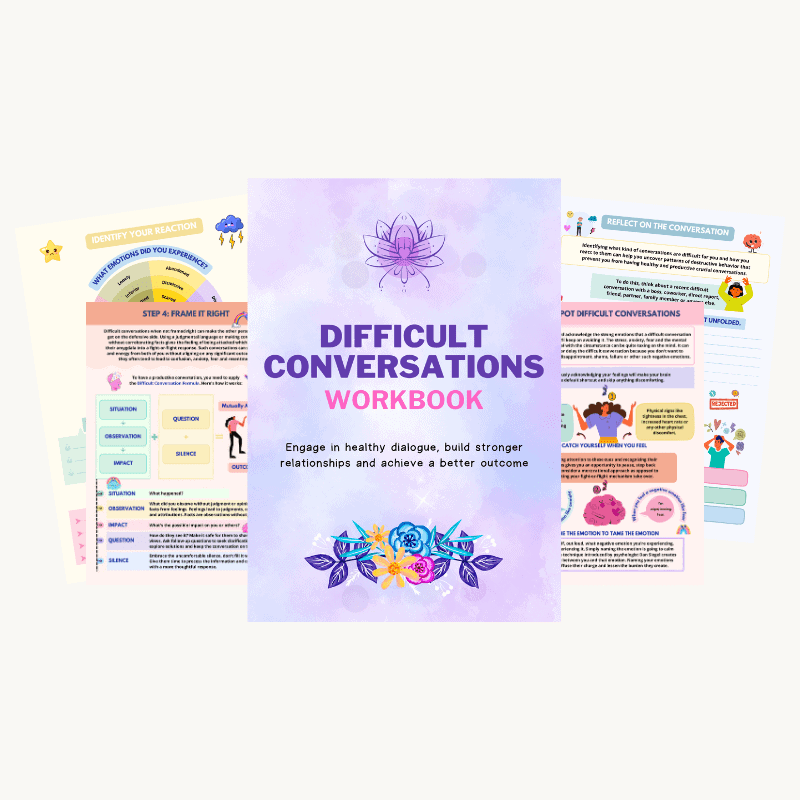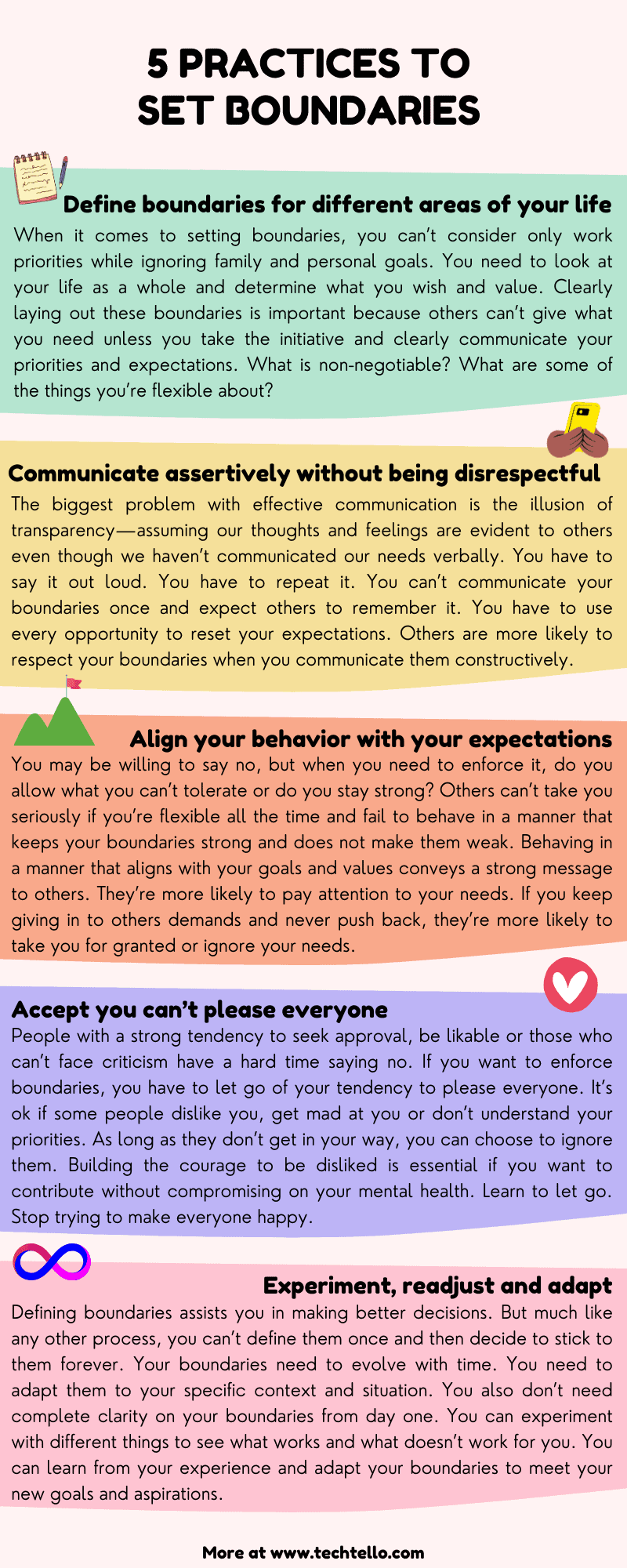How to Set Boundaries At Work

If you’re constantly irritated, feel demotivated or drained out, there’s a strong possibility that you’ve failed to set personal boundaries at work.
Your personal boundaries involve setting limits and defining expectations on what you will and will not tolerate.
Work without boundaries can impact your productivity and harm your mental health. Exhaustion from being available 24/7, never saying no or tolerating bad behavior can impact you emotionally and make you ineffective in your job.
When you give boundaryless freedom to others, they can manipulate your time and energy which can prevent you from doing your best work.
Not having boundaries also makes it difficult for others to meet your expectations. Unspoken boundaries are often invisible—easy to violate as they’re based on each person’s own life experience. Don’t assume others are bad or they’re out to get you—they may just value different things or have different priorities in life.
Setting boundaries inevitably involves taking responsibility for your choices. You are the one who makes them. You are the one who must live with their consequences. And you are the one who may be keeping yourself from making the choices you could be happy with.
— Henry Cloud, Boundaries
You don’t have to put up with schedules, people and practices that puts your well-being at risk or turns you into a resentful person. You just have to learn to communicate your needs by setting healthy boundaries and ensuring others take it seriously.
Do this by following these 5 practices:
Define boundaries for different areas of your life
When it comes to setting boundaries, you can’t consider only work priorities while ignoring family and personal goals. You need to look at your life as a whole and determine what you wish and value.
Clearly laying out these boundaries is important because others can’t give what you need unless you take the initiative and clearly communicate your priorities and expectations.
To do this, you must first know what you want.
Think about:
- What is non-negotiable—things you won’t compromise on. These if not met will significantly impact your well-being.
- What are some of the things you’re flexible about and willing to change if the situation demands it?
- What kind of responsibilities can you handle and what kind of tasks do not align with your goals?
- What are your limits—be honest to yourself about what you can realistically achieve.
For example:
- Leaving the office on Friday by 5 pm to take your daughter for her music lessons.
- Unavailable to take calls between 6-7pm to go to the gym.
- Only respond to urgent phone calls after 6pm. Emails have to wait.
When we fail to set boundaries and hold people accountable, we feel used and mistreated. This is why we sometimes attack who they are, which is far more hurtful than addressing a behavior or a choice.
— Brené Brown, The Gifts of Imperfection
When you’re clear about your own priorities, it’s possible to convince others to respect them.
Communicate assertively without being disrespectful
The biggest problem with effective communication is the illusion of transparency—assuming our thoughts and feelings are evident to others even though we haven’t communicated our needs verbally.
Under the effect of this cognitive bias, you may fail to explicitly communicate your expectations and feel a deep sense of dissatisfaction, anger or frustration when others overstep these boundaries.
You have to say it out loud. You have to repeat it. You can’t communicate your boundaries once and expect others to remember it. You have to use every opportunity to reset your expectations.
When you give yourself permission to communicate what matters to you in every situation you will have peace despite rejection or disapproval. Putting a voice to your soul helps you to let go of the negative energy of fear and regret.
— Shannon L. Alder
While doing this, it’s very important that you demonstrate positivity in your body language—don’t use facial expressions or hand gestures that demonstrate resentment or bitterness towards the other person. When others sense disrespect, all they can think about is hurting you back.
For example, you can say:
I noticed that you’ve scheduled a meeting on Friday at 5pm. I understand that I need to be part of that meeting. It appears you forgot that I leave early on Friday to take my daughter out for her music lessons. Can you reschedule it please?
I understand that you want me to take up this new responsibility because I have the required knowledge and experience to drive it well. However, I already have too many things on my plate. I don’t see how I can take it up without giving up something else. Can you help me re-prioritize and create space for this task by identifying work that can be delayed?
Be firm and direct. Communicate your needs more than once. Others are more likely to respect your boundaries when you communicate them constructively.
Master Difficult Conversations
Engage in healthy dialogue, build stronger relationships and achieve a better outcome.
Align your behavior with your expectations
You may be willing to say no, but when you need to enforce it, do you allow what you can’t tolerate or do you stay strong?
Others can’t take you seriously if you’re flexible all the time and fail to behave in a manner that keeps your boundaries strong and does not make them weak.
Thinking “I’ll allow just this once” should be an exception, not a norm.
Behaving in a manner that aligns with your goals and values conveys a strong message to others. They’re more likely to pay attention to your needs. If you keep giving in to others demands and never push back, they’re more likely to take you for granted or ignore your needs.
How can we expect people to put value on our work when we don’t value ourselves enough to set and hold uncomfortable boundaries?
— Brené Brown, Rising Strong
Stop giving others permission to behave in a manner that’s unacceptable to you by aligning your words with your actions.
For example:
If you need to leave the office by 5pm and your colleague refuses to reschedule the meeting, leave the office as communicated. Let them know that you won’t be available and they will need to get your inputs later.
If your senior shouts at you for not meeting their requirements on a research project, politely let them know that they can communicate their expectations calmly. Ask them about the gaps and discuss what you plan to do next and by when.
Actions speak louder than words. Don’t refuse to put your foot down, don’t compromise, don’t give permission to others to negotiate in matters that are important to you.
Accept you can’t please everyone
People with a strong tendency to seek approval, be likable or those who can’t face criticism have a hard time saying no.
They may not realize it, but this is how they behave:
- Jump to solve every crisis at work.
- Say yes to projects even when they already have too much to do.
- Push personal commitments aside to make time for others.
If you want to enforce boundaries, you have to let go of your tendency to please everyone. It’s ok if some people dislike you, get mad at you or don’t understand your priorities. As long as they don’t get in your way, you can choose to ignore them.
To do this, you first have to accept that you may be a people pleaser. Ask these questions:
- Are you making the right commitments, first to yourself and then to others?
- Are you fearful of saying no?
- Do you prioritize helping others at the cost of your own health?
- Do you have the courage to be disliked?
- Do you push your personal commitments aside to make time for others?
- Do you feel angry and resentful in trying to meet others’ expectations?
- Do you feel taken for granted?
- Do you have a hard time letting others down?
- Are you exhausted from pretending and trying to keep everyone happy?
The hardest thing about implementing boundaries is accepting that some people won’t like, understand, or agree with yours. Once you grow beyond pleasing others, setting your standards becomes easier. Not being liked by everyone is a small consequence when you consider the overall reward of healthier relationships.
— Nedra Glover Tawwab, Set Boundaries
Building the courage to be disliked is essential if you want to contribute without compromising on your mental health. Learn to let go. Stop trying to make everyone happy.
Experiment, readjust and adapt
Defining boundaries assists you in making better decisions. But much like any other process, you can’t define them once and then decide to stick to them forever.
Your boundaries need to evolve with time. You need to adapt them to your specific context and situation.
You also don’t need complete clarity on your boundaries from day one. You can experiment with different things to see what works and what doesn’t work for you. You can learn from your experience and adapt your boundaries to meet your new goals and aspirations.
To do this:
- Start with defining a few boundaries.
- Communicate to people who need to know.
- Review how you’re doing each month. Which boundaries are helping and which boundaries are not giving you the desired results? Are there any boundaries that conflict with your new goals?
- What changes do you need to make to align your boundaries with the current reality of your situation?
- How can you put these changes into action?
An experimental mindset helps you keep up with the changing times. Instead of sticking to boundaries that no longer serve you well, it enables you to learn, adapt and evolve.
There are reasons to set boundaries for yourself, but there are also reasons to keep doors open.
—Ashley Graham
However, remember this: if your work environment is toxic, setting boundaries can’t protect you. In such environments, others will repeatedly disrespect your boundaries and you will receive constant pushback on things you value.
Instead of trying to fight the system or trying to fix a broken culture which is beyond repair, spend that time and energy in finding a new job.
Quitting and moving to a healthy workplace is your only option.
Summary
- Boundaries protect you. They don’t make you egoist, eccentric or self-absorbed. Rather, they put you as a highly self-aware person with clear goals and aspirations.
- Protecting your boundaries may seem futile if you’re used to being exploited. However, don’t ignore the possibility that others don’t respect your boundaries because you haven’t applied the right strategies to make them work for you.
- Start with defining your boundaries. Clearly lay out your priorities and expectations. Knowing what you want is the first step in turning your dreams into reality.
- Explicitly communicate your boundaries, not once but at every occasion. Remind people who tend to forget without coming across as rude or disrespectful. Others are more likely to pay attention to your needs when you say them out loud instead of keeping quiet.
- Saying is one thing and acting on it another. If you keep taking your boundaries lightly, others are more likely to misuse them too. Act in ways you want others to behave. Communicate a strong message by aligning your words with your actions.
- Your agenda is to protect your boundaries and not make everyone happy. Accept the fact that some people may not like it. You don’t have to please anyone.
- Finally, boundaries aren’t meant to be defined once. You have to keep working on them by using the feedback loop to change and adapt.






























